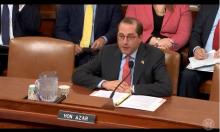The opioid abuse epidemic took center stage during a hearing of the House Ways and Means Committee, during which Alex Azar, secretary of the Department of Health & Human Services, defended the White House budget proposal for fiscal year 2019.
The president’s budget, released Feb. 13, allocates $5 billion in new resources over the next 5 years to combat the opioid abuse epidemic
During his Feb. 14 testimony, Mr. Azar said that the budget proposal “brings a new level of commitment to fighting the crisis of opioid addiction and overdose that is stealing more than 100 American lives from us every single day.”
He noted that part of the funding request includes spending $500 million to launch public-private partnership with the National Institutes of Health “to development new addiction treatments, new overdose-reversing drugs, and nonaddictive approaches to pain.”
Mr. Azar called for greater use of nonopioid pain management techniques and better communication between the HHS and the Drug Enforcement Agency to identify doctors who overprescribe opioids.
“I really want to focus on that entry point to working with DEA on ways that we can control pill mills and even just bad practice that has become part of our culture of medicine of giving people excessive numbers of pills when they do not need them,” Mr. Azar said.
The administration’s proposals for addressing the opioid crisis revealed partisan divisions among members of the Ways and Means Committee, as Republican members of the committee hailed the White House proposals while Democrats argued that the budget proposal could make it more difficult for people to fight the crisis.
Noting that many who have opioid use disorders rely on Medicaid for health insurance, Rep. Richard Neal (D-Mass.), the ranking member on the committee, noted that the proposed budget cuts $1.4 trillion from Medicaid and $500 billion from Medicare.
Physician groups were quick to point out that the budget proposal calls for addressing health care issues while simultaneously cutting the necessary funding.
The Infectious Diseases Society of America said in a statement that “while we appreciate continued funding for antimicrobial resistance research and development through the Biomedical Advanced Research and Development Authority, the current investment is insufficient, as evidenced by an antibiotic pipeline that falls far short of projected needs, while pharmaceutical company investments in antibiotic research continue to diminish. Also, the plan would limit CDC [Centers for Disease Control and Prevention] efforts to address and prevent growing resistance to existing antimicrobial drugs with a nearly $25 million cut.”
The White House budget proposal also tackles drug pricing and payment, including a new Medicaid demonstration program that would allow up to five participating states to test the use of drug formularies in the Medicaid program, speed the access to generic medications, and modify the Medicare Part D prescription drug program. Mr. Azar also reiterated his openness to government price negotiation for drugs administered in the physician office under Medicare Part B.
The proposal on drug discounts was praised by the Community Oncology Alliance (COA).
“The White House budget proposal for sharing manufacturer rebates and discounts with seniors in Medicare Part D is also a great idea,” COA said in a statement. “Pharmacy benefit managers have been enriching themselves with these rebates for too long, and their growing scale has resulted in higher drug costs for everyone. COA believes that the proposed Part D change to share rebates and discounts proposed will lower costs for patients, taxpayers, and the government.”
The budget proposal reflects President Trump’s desire to see the Affordable Care Act repealed and is built on that premise, but questions linger as to whether Congress will take up health care legislation again this year.


